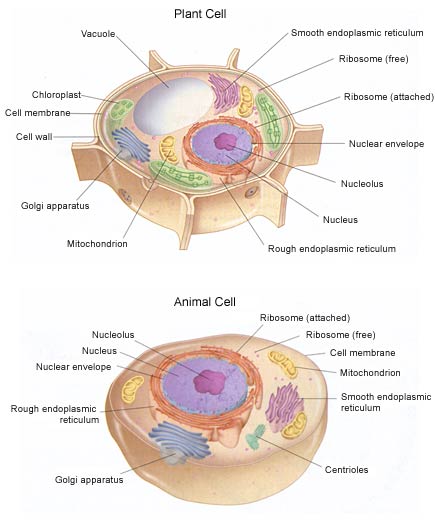The Cells

Cell means 'little room' in Latin...
Ready...
Robert Hooke coined the term when he was viewing dead cork through a primitive microscope.
The vocabulary list is helpful as you complete this review.
It's alive
- All living organisms are made of one or more cells
- The cell is the basic unit of life
- All cells come from existing cells
Organisms
- Organisms consisting of one cell are unicellular
- Think unicycle
- Organisms consisting of two or more cells we call multicellular
- Humans have about 100 trillion cells
- Is that a lot of cells?

From Biology, by Kenneth R. Miller and Joseph Levine, ©2002 by Pearson Education, Inc.
There are Two Types of Cells
- Prokaryotic
- No nucleus
- No organelles contained in the membrane
- Circular DNA
- Example
- Bacteria
- Blue Green Algea
- Eukaryotic
- A nucleus
- Organelles contained in the membrane
- Example
- Brain cells
- Skin cells
- Plant cells
Plant Cell - Organelles
- Cell Wall
- Cell Membrane
- Cytoplasm
- Nucleus
- Central Vacuole
- Chloroplast
- Lysosome
- Endoplasmic Reticulum
- Golgi Apparatus
- Mitochondria
- Ribosome
Animal Cell - Organelles
- Cell Membrane
- Cytoplasm
- Nucleus
- Nucleolus
- Endoplasmic Reticulum
- Rough
- Smooth
- Golgi Apparatus
- Lysosome
- Mitochondrion
- Ribosome
Set...
This lesson is a review of the last unit. You'll have an opportunity to refresh the topic of cells. If you are already comfortable with the information then move on to the next lesson.
To start with, if you have not done so, open the vocabulary list.
Now open a copy of your Student Notes from the last lesson.
Review the worksheets for this lesson:
Pick one of the lessons above to complete at home and upload to your personal forum or drop-box.
Go...
Check out the video and open the video quiz. The video will be opened in a separate tab or window. Answer the question while you watch.
After watching the movie in class with your lab partner, discuss what resources are helpful for you remember two concepts.
Your group will take 5 minutes to share and explain the two concepts and resources with the class. Followed by a 5-minute question-and-answer time.
Post your discussion notes to the Lesson group form (Under Genetics unit). Remember, preface your notes with your group id.